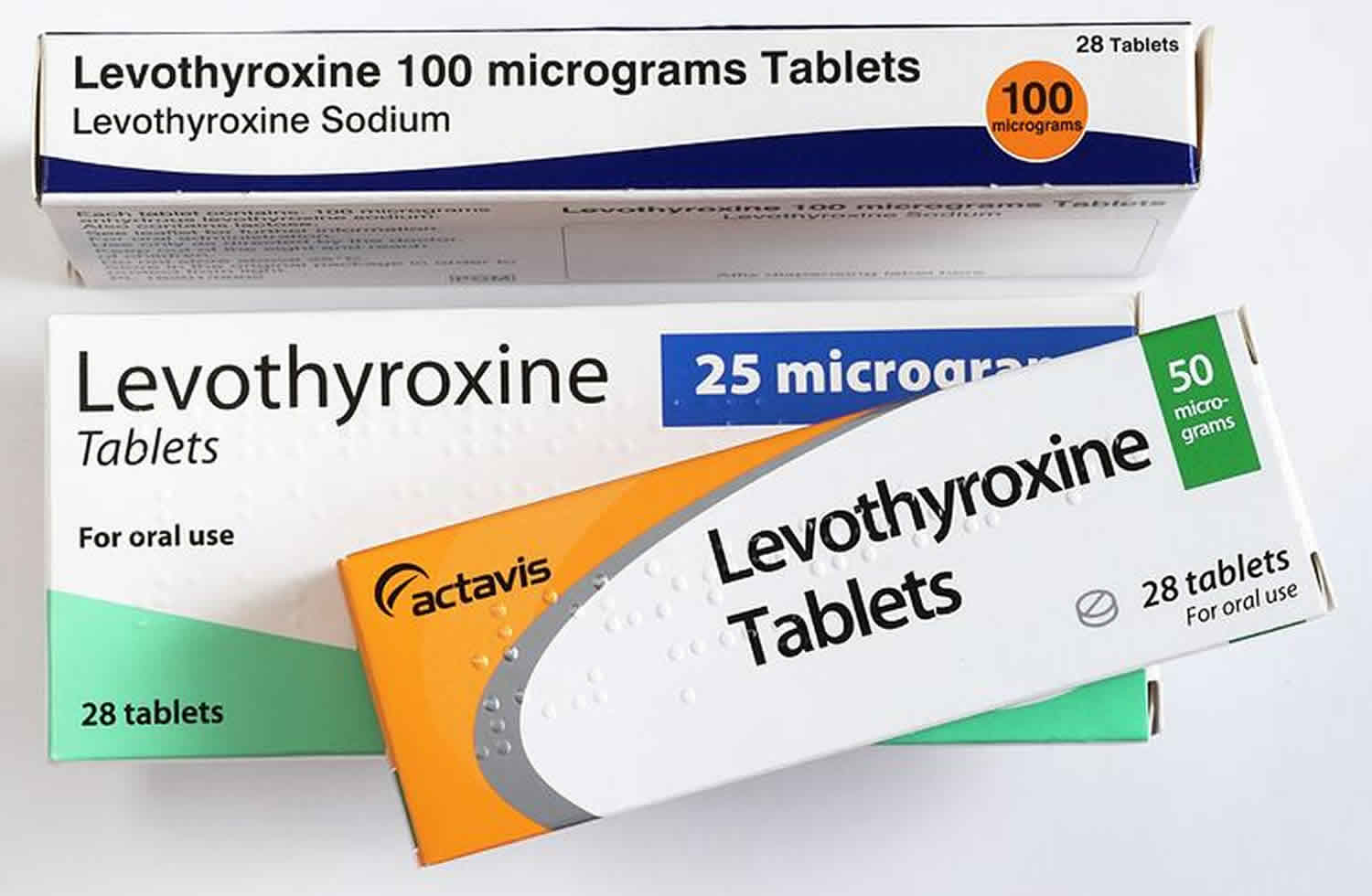What is levothyroxine
Levothyroxine (a thyroid hormone) or levothyroxine sodium, is a thyroid medicine that replaces a hormone normally produced by your thyroid gland to regulate the body’s energy and metabolism. Levothroid, Levoxyl, Synthroid and Unithroid are the brand names of levothyroxine medication. Levothyroxine is used to treat hypothyroidism (low thyroid hormone), a condition where your thyroid gland does not produce enough thyroid hormone. Levothyroxine is also used to treat or prevent goiter (enlarged thyroid gland), which can be caused by hormone imbalances, radiation treatment, surgery, or cancer. Levothyroxine is sometimes also used with surgery and radioactive iodine therapy to treat thyroid cancer. Levothyroxine is in a class of medications called hormones. Levothyroxine works by replacing thyroid hormone that is normally produced by your thyroid gland. Levothyroxine is available only with your doctor’s prescription.
Without thyroid hormone, your body cannot function properly, which may result in poor growth, slow speech, lack of energy, excessive tiredness, constipation, weight gain, hair loss, dry, thick skin, increased sensitivity to cold, joint and muscle pain, heavy or irregular menstrual periods, and depression. When taken correctly, levothyroxine reverses these symptoms.
Levothyroxine is a synthetic form of L-thyroxine (levothyroxine, T4, a thyroid hormone) that is an orally available form of T4 (thyroxine, a thyroid hormone) that is commonly used to treat hypothyroidism and maintain the euthyroid state. Other forms of thyroid hormone include thyroid extract and triiodothyronine (T3) or liothyronine. Thyroid hormone is essential for normal growth, particularly of the central nervous system. In adults, thyroid hormone maintains normal metabolism in virtually all organ systems. Thyroxine (T4) is released from the thyroid gland, but is converted in the liver and other tissues to the active form, which is triiodothyronine (T3) which engages thyroid hormone receptors in the nucleus of cells, which together bind to DNA, leading to transcription of thyroid responsive genes that have multiple actions in different cells affecting cell metabolism. Thyroid hormone is necessary for normal growth and development, and deficiency of thyroid hormone results in cretinism in children and hypothyroidism and myxedema in adults with a multitude of symptoms, signs and laboratory abnormalities, including fatigue, weight gain, drowsiness, mental torpor and confusion.
Hypothyroidism is readily treated with oral forms of thyroid hormone which have been in clinical use for over 50 years, the most commonly used being desiccated thyroid (Armour Thyroid, 1950s), synthetic L-thyroxine or levothyroxine (T4, Synthroid, Levoxyl and others: 2002), and L-triiodothyronine or liothyronine (T3, Cytomel: 1956). Levothyroxine is currently one of the most commonly prescribed medications in the United States, with more than 100 million prescriptions filled yearly. The current indications are for maintenance of the euthyroid state.
Levothyroxine side effects are uncommon at correct replacement doses, but high doses can cause symptoms of hyperthyroidism such as fatigue, weight loss, headache, anxiety, tremor, muscle weakness, tachycardia, cardiac arrhythmias, menstrual abnormalities, irritability, emotional labiality, sleep disturbance and changes in personality.
Levothyroxine (a thyroid hormone) should not be used alone or along with other treatments to treat obesity or cause weight loss.
Levothyroxine may cause serious or life-threatening problems when given in large doses, especially when taken with amphetamines such as amphetamine (Adzenys, Dyanavel XR, Evekeo), dextroamphetamine (Dexedrine), and methamphetamine (Desoxyn). Tell your doctor if you have any of the following symptoms while you are taking levothyroxine: chest pain, rapid or irregular heartbeat or pulse, uncontrollable shaking of a part of the body, nervousness, anxiety, irritability, difficulty falling asleep or staying asleep, shortness of breath, or excessive sweating.
Talk to your doctor about the potential risks associated with this medication.
Levothyroxine uses
Levothyroxine is used to treat hypothyroidism, a condition where the thyroid gland does not produce enough thyroid hormone. Levothyroxine is also used to help decrease the size of enlarged thyroid glands (also called a goiter) and to treat thyroid cancer.
Hypothyroidism
Used orally as replacement or supplemental therapy in congenital or acquired hypothyroidism of any etiology, except transient hypothyroidism during the recovery phase of subacute thyroiditis 1. Specific indications include subclinical hypothyroidism and primary (thyroidal), secondary (pituitary), and tertiary (hypothalamic) hypothyroidism 2.
Considered drug of choice for the treatment of congenital hypothyroidism (cretinism).
Used IV for treatment of myxedema coma 3.
Has been used IV in other conditions when rapid thyroid replacement is required†;161 however, this is not an FDA-labeled use for the currently available injection 3.
Pituitary TSH Suppression
Treatment or prevention of various types of euthyroid goiters, including thyroid nodules, subacute or chronic lymphocytic thyroiditis (Hashimoto’s thyroiditis), and multinodular goiter 1.
Adjunct to surgery and radioiodine therapy in the management of thyrotropin-dependent well-differentiated thyroid cancer 1.
Efficacy of TSH suppression for benign nodular disease remains controversial 1.
How to take levothyroxine
Levothyroxine is available in tablets at of 25 to 300 mcg for oral administration and as a lyophilized powder for parenteral use. Levothyroxine usually is taken once a day on an empty stomach, 30 minutes to 1 hour before breakfast. Levothyroxine is typically started at a low daily dose (25 to 50 mcg) and increased based upon clinical effect and serum levels of thyroid stimulating hormone (TSH) and free T4. The usual adult replacement dose is 75 to 125 mcg daily. Follow the directions on your prescription label carefully, and ask your doctor or pharmacist to explain any part you do not understand. Take levothyroxine exactly as directed. Do not take more or less of it or take it more often than prescribed by your doctor.
Swallow capsules whole; do not chew or crush them. Do not remove the capsule from the package until you are ready to take it.
Take the tablets with a full glass of water as they may get stuck in your throat or cause choking or gagging.
If you are giving levothyroxine to an infant, child, or adult who cannot swallow the tablet, crush and mix it in 1 to 2 teaspoons (5 to 10 mL) of water. Only mix the crushed tablets with water; do not mix it with food or soybean infant formula. Give this mixture by spoon or dropper right away. Do not store it for later use.
Your doctor will probably start you on a low dose of levothyroxine and gradually increase your dose.
Levothyroxine controls hypothyroidism but does not cure it. It may take several weeks before you notice a change in your symptoms. Continue to take levothyroxine even if you feel well. Do not stop taking levothyroxine without talking to your doctor.
Levothyroxine special precautions
Before taking levothyroxine:
- tell your doctor and pharmacist if you are allergic to levothyroxine, thyroid hormone, any other medications, or any of the ingredients in levothyroxine tablets or capsules. Ask your pharmacist for a list of the ingredients.
- tell your doctor and pharmacist what prescription and nonprescription medications, vitamins, nutritional supplements, and herbal products you are taking or plan to take. Be sure to mention any of the following or those listed in the IMPORTANT WARNING section: amiodarone (Nexterone, Pacerone); androgens such as nandrolone and testosterone (Androderm); certain antacids containing aluminum or magnesium (Maalox, Mylanta, others); anticoagulants (‘blood thinners’) such as heparin or warfarin (Coumadin, Jantoven); beta-blockers such as metoprolol (Lopressor), propranolol (Inderal, Innopran), or timolol; medications for cancer such as asparaginase, fluorouracil, and mitotane (Lysodren); carbamazepine (Carbatrol, Equetro, Tegretol, or Teril); clofibrate (Atromid); corticosteroids such as dexamethasone; medications for cough and cold symptoms or for weight loss; digoxin (Lanoxin); medications containing estrogen such as hormone replacement therapy or hormonal contraceptives (birth control pills, patches, rings, implants, or injections); furosemide (Lasix); insulin or other medications to treat diabetes; maprotiline; mefenamic acid (Ponstel); methadone (Methadose); niacin; orlistat (Alli, Xenical); phenobarbital; phenytoin (Dilantin, Phenytek); proton pump inhibitors such as esomeprazole (Nexium), lansoprazole (Prevacid), and omeprazole (Prilosec); rifampin (Rifater, Rifamate, Rifadin); sertraline (Zoloft); simethicone (Phazyme, Gas X); sucralfate (Carafate); tamoxifen (Soltamox); tyrosine kinase inhibitors such as cabozantinib (Cometriq) or imatinib (Gleevac); and tricyclic antidepressants such as amitriptyline (Elavil). Many other medications may also interact with levothyroxine, so be sure to tell your doctor about all the medications you are taking, even those that do not appear on this list. Your doctor may need to change the doses of your medications or monitor you carefully for side effects.
- if you take calcium carbonate (Tums) or ferrous sulfate (iron supplement), take it at least 4 hours before or 4 hours after you take levothyroxine. If you take cholestyramine (Prevalite), colesevelam (Welchol), colestipol (Colestid), sevelamer (Renvela, Renagel), or sodium polystyrene sulfonate (Kayexalate), take it at least 4 hours after you take levothyroxine.
- tell your doctor if you have adrenal insufficiency (condition in which the adrenal glands do not produce enough of certain hormones needed for important body functions). Your doctor may tell you not to take levothyroxine.
- tell your doctor if you have recently received radiation therapy or if you have or have ever had diabetes; hardening of the arteries (atherosclerosis); bleeding problems or anemia; porphyria (condition in which abnormal substances build up in the blood and cause problems with the skin or nervous system); osteoporosis (a condition in which the bones become thin and weak and break easily); pituitary gland (a small gland in the brain) disorders; any condition that makes it difficult for you to swallow; or kidney, heart, or liver disease.
- tell your doctor if you are pregnant, plan to become pregnant or are breastfeeding. If you become pregnant while taking levothyroxine, call your doctor.
if you have surgery, including dental surgery, tell the doctor or dentist that you are taking levothyroxine.
Allergies
- Tell your doctor if you have ever had any unusual or allergic reaction to this medicine or any other medicines. Also tell your health care professional if you have any other types of allergies, such as to foods, dyes, preservatives, or animals. For non-prescription products, read the label or package ingredients carefully.
Pediatric
- Appropriate studies performed to date have not demonstrated pediatric-specific problems that would limit the usefulness of levothyroxine in children.
Geriatric
- Appropriate studies performed to date have not demonstrated geriatric-specific problems that would limit the usefulness of levothyroxine in the elderly. However, elderly patients are more likely to have age-related heart or blood vessel problems, which may require caution and an adjustment in the dose for patients receiving levothyroxine.
Breastfeeding
Studies in women suggest that this medication poses minimal risk to the infant when used during breastfeeding.
Special dietary instructions
Some foods and beverages, particularly those that contain soybeans, walnuts, and dietary fiber, may affect how levothyroxine works for you. Talk to your doctor before eating or drinking these foods.
Talk to your doctor about eating grapefruit and drinking grapefruit juice while taking this medication.
Levothyroxine interactions
Although certain medicines should not be used together at all, in other cases two different medicines may be used together even if an interaction might occur. In these cases, your doctor may want to change the dose, or other precautions may be necessary. When you are taking levothyroxine, it is especially important that your healthcare professional know if you are taking any of the medicines listed below. The following interactions have been selected on the basis of their potential significance and are not necessarily all-inclusive.
Using levothyroxine with any of the following medicines is usually not recommended, but may be required in some cases. If both medicines are prescribed together, your doctor may change the dose or how often you use one or both of the medicines.
- Midodrine
Using levothyroxine with any of the following medicines may cause an increased risk of certain side effects, but using both drugs may be the best treatment for you. If both medicines are prescribed together, your doctor may change the dose or how often you use one or both of the medicines.
- Aluminum Carbonate, Basic
- Aluminum Hydroxide
- Aluminum Phosphate
- Calcium Acetate
- Calcium Carbonate
- Calcium Citrate
- Chlorotrianisene
- Cholestyramine
- Chromium
- Ciprofloxacin
- Colesevelam
- Conjugated Estrogens
- Conjugated Estrogens Synthetic A
- Conjugated Estrogens Synthetic B
- Dexlansoprazole
- Dienestrol
- Diethylstilbestrol
- Dihydroxyaluminum Aminoacetate
- Dihydroxyaluminum Sodium Carbonate
- Eltrombopag
- Esomeprazole
- Esterified Estrogens
- Estradiol
- Estramustine
- Estriol
- Estropipate
- Ethinyl Estradiol
- Fosphenytoin
- Imatinib
- Iron
- Kelp
- Lansoprazole
- Lanthanum Carbonate
- Lopinavir
- Magaldrate
- Magnesium Carbonate
- Magnesium Hydroxide
- Magnesium Oxide
- Magnesium Trisilicate
- Mestranol
- Omeprazole
- Pantoprazole
- Patiromer
- Phenytoin
- Polyestradiol Phosphate
- Promestriene
- Quinestrol
- Rabeprazole
- Rifampin
- Ritonavir
- Sevelamer
- Simvastatin
- Tibolone
Other Interactions
Certain medicines should not be used at or around the time of eating food or eating certain types of food since interactions may occur. Using alcohol or tobacco with certain medicines may also cause interactions to occur. The following interactions have been selected on the basis of their potential significance and are not necessarily all-inclusive.
Using levothyroxine with any of the following may cause an increased risk of certain side effects but may be unavoidable in some cases. If used together, your doctor may change the dose or how often you use this medicine, or give you special instructions about the use of food, alcohol, or tobacco.
- Enteral Nutrition
- Soybean
Other medical problems
The presence of other medical problems may affect the use of levothyroxine. Make sure you tell your doctor if you have any other medical problems, especially:
- Adrenal gland insufficiency (underactive adrenal gland), untreated or
- Heart attack, acute or recent or
- Thyrotoxicosis (overactive thyroid), untreated—Should not be used in patients with these conditions.
- Adrenal problems or
- Anemia, pernicious or
- Angina (severe chest pain), history of or
- Blood clotting problems, or history of or
- Diabetes or
- Heart or blood vessel disease (eg, coronary artery disease, heart failure), history of or
- Heart rhythm problems (eg, arrhythmia, atrial fibrillation), history of or
- Osteoporosis, history of or
- Pituitary gland problems—Use with caution. May make these conditions worse.
Patients who have trouble swallowing capsules (including children younger than 6 years of age)—Tirosint® should not be given in these patients.
Levothyroxine dosage
The dose of levothyroxine will be different for different patients. Follow your doctor’s orders or the directions on the label. The following information includes only the average doses of levothyroxine. If your dose is different, do not change it unless your doctor tells you to do so.
The amount of medicine that you take depends on the strength of the medicine. Also, the number of doses you take each day, the time allowed between doses, and the length of time you take the medicine depend on the medical problem for which you are using the medicine.
For oral dosage form (capsules):
- For hypothyroidism:
- Adults and children older than 12 years of age (growth and puberty complete)—Dose is based on body weight and must be determined by your doctor. The dose is usually 1.7 microgram (mcg) per kilogram (kg) of body weight per day but may be less in older adults.
- Children older than 12 years of age (growth and puberty incomplete)—Dose is based on body weight and must be determined by your doctor. The dose is usually 2 to 3 mcg per kg of body weight per day.
- Children 6 to 12 years of age—Dose is based on body weight and must be determined by your doctor. The dose is usually 4 to 5 mcg per kg of body weight per day.
- Children younger than 6 years of age—Use is not recommended as your child might not be able to swallow the capsules.
- For thyroid cancer:
- Adults—Dose is based on body weight and must be determined by your doctor. The dose is usually more than 2 microgram (mcg) per kilogram (kg) of body weight per day.
- Children—Use and dose must be determined by your doctor.
For oral dosage form (solution):
- For hypothyroidism:
- Adults and children older than 12 years of age (growth and puberty complete)—Dose is based on body weight and must be determined by your doctor. The starting dose is usually 1.7 microgram (mcg) per kilogram (kg) of body weight per day. Your doctor may adjust your dose as needed.
- Children older than 12 years of age (growth and puberty incomplete)—Dose is based on body weight and must be determined by your doctor. The dose is usually 2 to 3 mcg per kg of body weight per day.
- Children 6 to 12 years of age—Dose is based on body weight and must be determined by your doctor. The dose is usually 4 to 5 mcg per kg of body weight per day.
- Children 1 to 5 years of age—Dose is based on body weight and must be determined by your doctor. The dose is usually 5 to 6 mcg per kg of body weight per day.
- Children 6 to 12 months of age—Dose is based on body weight and must be determined by your doctor. The dose is usually 6 to 8 mcg per kg of body weight per day.
- Children 3 to 6 months of age—Dose is based on body weight and must be determined by your doctor. The dose is usually 8 to 10 mcg per kg of body weight per day.
- Children 0 to 3 months of age—Dose is based on body weight and must be determined by your doctor. The dose is usually 10 to 15 mcg per kg of body weight per day.
- For thyroid cancer:
- Adults—Dose is based on body weight and must be determined by your doctor. The dose is usually more than 2 microgram (mcg) per kilogram (kg) of body weight per day.
- Children—Use and dose must be determined by your doctor.
For oral dosage form (tablet):
- For hypothyroidism:
- Adults and children older than 12 years of age (growth and puberty complete)—Dose is based on body weight and must be determined by your doctor. The dose is usually 1.6 microgram (mcg) per kilogram (kg) of body weight per day but may be less in older adults.
- Children older than 12 years of age (growth and puberty incomplete)—Dose is based on body weight and must be determined by your doctor. The dose is usually 2 to 3 mcg per kg of body weight per day.
- Children 6 to 12 years of age—Dose is based on body weight and must be determined by your doctor. The dose is usually 4 to 5 mcg per kg of body weight per day.
- Children 1 to 5 years of age—Dose is based on body weight and must be determined by your doctor. The dose is usually 5 to 6 mcg per kg of body weight per day.
- Children 6 to 12 months of age—Dose is based on body weight and must be determined by your doctor. The dose is usually 6 to 8 mcg per kg of body weight per day.
- Children 3 to 6 months of age—Dose is based on body weight and must be determined by your doctor. The dose is usually 8 to 10 mcg per kg of body weight per day.
- Children 0 to 3 months of age—Dose is based on body weight and must be determined by your doctor. The dose is usually 10 to 15 mcg per kg of body weight per day.
Adult dose for hypothyroidism
Use: As replacement therapy in primary (thyroidal), secondary (pituitary), and tertiary (hypothalamic) congenital or acquired hypothyroidism
Dosing should be individualized with consideration given to age, cardiovascular status, concomitant medical conditions (including pregnancy), and specific nature of condition; follow clinical response and laboratory parameters closely as dose is adjusted:
INITIAL DOSES
Primary Hypothyroidism:
Healthy Individuals who have been Hypothyroid for a Short Time (a few months):
- Initial dose: 1.6 mcg/kg orally once a day
- Adjust dose in 12.5 to 25 mcg increments every 4 to 6 weeks until clinically euthyroid and TSH returns to normal
Individuals over 50 years and/or Patients with Cardiovascular Disease:
- Initial dose: 12.5 to 25 mcg orally once a day
- Adjust dose at 6 to 8-weeks intervals until clinically euthyroid and TSH returns to normal
Severe Longstanding Hypothyroidism:
- Initial dose: 12.5 to 25 mcg orally once a day
- Adjust dose in increments of 12.5 to 25 mcg/day every 2 to 4 weeks until clinically euthyroid and TSH returns to normal
MAINTENANCE DOSE: Approximately 1.6 mcg/kg/day is a full replacement dose
MAXIMUM dose: 200 to 300 mcg/day (doses greater than 200 mcg/day are seldom needed; doses greater than 300 mcg/day are rarely needed and may indicate poor compliance, malabsorption, drug interactions, or a combination of these factors)
Secondary (PITUITARY) OR Tertiary (HYPOTHALAMIC) Hypothyroidism:
- Dosing as described above except serum free-T4 level will be used to monitor therapy; serum TSH levels are not a reliable measure and should not be used
- Titrate until clinically euthyroid and serum free-T4 levels are restored to the upper half of the normal range
Comments:
- Dose should be individualized with regular monitoring of clinical status and laboratory parameters.
- Peak effect of a given dose may not be attained for 4 to 6 weeks.
- Not indicated for the treatment of hypothyroidism during the recovery phase of subacute thyroiditis.
- Co-administered food and concomitant medications may significantly affect absorption; take on an empty stomach and at least 4 hours before or after drugs known to interfere with levothyroxine absorption.
Adult dose for TSH suppression
Use: As an adjunct to surgery and radioiodine therapy in the management of thyrotropin-dependent well-differentiated thyroid cancer.
- TSH levels should generally be suppressed to below 0.1 IU/L
- A dose greater than 2 mcg/kg orally once a day is usually required to achieve this degree of suppression
Comments:
- Patients with high-risk tumors may target a greater level of TSH suppression, however, this is not well defined.
- This drug is not indicated for suppression of benign thyroid nodules and nontoxic diffuse goiter in iodine-sufficient patients as there are no clinical benefits and overtreatment may induce hyperthyroidism.
Adult dose for myxedema coma
Use: For the treatment of myxedema coma.
Parenteral Formulation:
- Initial loading dose: 300 to 500 mcg IV once
- Maintenance dose: 50 to 100 mcg IV once a day until patient can tolerate oral therapy
Comment:
- Age, general physical condition, cardiac risk factors, severity and duration of myxedema coma should be considered when determining the initial and maintenance dosages.
- The relative bioavailability between oral and IV levothyroxine is estimated to be 48% to 74%; due to individual differences, TSH levels should be measured and doses adjusted accordingly.
Geriatric dose for hypothyroidism
Use: As replacement therapy in primary (thyroidal), secondary (pituitary), and tertiary (hypothalamic) congenital or acquired hypothyroidism
- Initial dose: 12.5 to 25 mcg orally once a day
- Adjust dose at 6 to 8-weeks intervals until clinically euthyroid and TSH returns to normal
- Maintenance dose: Full replacement doses may be less than 1 mcg/kg/day
- Maximum dose: 200 to 300 mcg/day (doses greater than 200 mcg/day are seldom needed; doses greater than 300 mcg/day are rarely needed and may indicate poor compliance, malabsorption, drug interactions, or a combination of these factors)
Comments:
- Dosing should be individualized with consideration given to age, cardiovascular status, concomitant medical conditions, and the specific nature of condition; follow clinical response and laboratory parameters closely as dose is adjusted.
- Peak effect of a given dose may not be attained for 4 to 6 week; full recovery dose s.
- Not indicated for the treatment of hypothyroidism during the recovery phase of subacute thyroiditis.
- Co-administered food and concomitant medications may significantly affect absorption; take on an empty stomach and at least 4 hours before or after drugs known to interfere with levothyroxine absorption.
Pediatric dose for hypothyroidism
Use: For the treatment of congenital or acquired hypothyroidism.
- 0 to 3 months: 10 to 15 mcg/kg orally once a day
- 3 to 6 months: 8 to 10 mcg/kg orally once a day
- 6 to 12 months: 6 to 8 mcg/kg orally once a day
- 1 to 5 years: 5 to 6 mcg/kg orally once a day
- 6 to 12 years: 4 to 5 mcg/kg orally once a day
- 12 years or older and incomplete growth and puberty: 2 to 3 mcg/kg orally once a day
- 12 years or older with growth and puberty complete: 1.6 mcg/kg orally once a day
Newborns (0 to 3 months) at Risk for Cardiac Failure: Consider a lower initial dose; increase dose every 4 to 6 weeks as needed based on clinical and laboratory response
Pediatric Patients at Risk for Hyperactivity: Initial dose should be one-fourth the recommended full replacement dose; increase weekly by one-fourth to the full recommended replacement dose
Comments:
- Dose should be individualized with regular monitoring of clinical status and laboratory parameters; peak effect may not be attained for 4 to 6 weeks.
- Not indicated for the treatment of hypothyroidism during the recovery phase of subacute thyroiditis.
- Co-administered food and concomitant medications may significantly affect absorption; take on an empty stomach and at least 4 hours before or after drugs known to interfere with levothyroxine absorption.
- The capsule formulation is indicated for patients 6 years or older as the capsule should be swallowed whole; see Other Comment/Administration Advice for specific administration instructions including instructions for those unable to swallow intact tablets.
Renal Dose Adjustments
- No adjustment recommended
Liver Dose Adjustments
- No adjustment recommended
What should I do if I forget a dose?
Take the missed dose as soon as you remember it. However, if it is almost time for the next dose, skip the missed dose and continue your regular dosing schedule. Do not take a double dose to make up for a missed one.
Levothyroxine side effects
Levothyroxine may cause side effects. Tell your doctor if any of these symptoms are severe or do not go away:
- weight gain or loss
- headache
- vomiting
- diarrhea
- changes in appetite
- fever
- changes in menstrual cycle
- sensitivity to heat
- hair loss
- joint pain
- leg cramps
Less common side effects:
- chest pain or discomfort
- decreased urine output
- difficult or labored breathing
- difficulty with swallowing
- dilated neck veins
- extreme fatigue
- fainting
- fast, slow, irregular, pounding, or racing heartbeat or pulse
- fever
- heat intolerance
- hives or welts, skin itching, rash, or redness
- irregular breathing
- irritability
- menstrual changes
- nausea
- pain or discomfort in the arms, jaw, back, or neck
- sweating
- swelling of the eyes, face, lips, throat, or tongue
- tightness in the chest
- tremors
Rare side effects:
- blurred or double vision
- dizziness
- eye pain
- lack or slowing of normal growth in children
- limp or walk favoring one leg
- pain in the hip or knee
- seizures
- severe headache
Some side effects can be serious. If you experience either of the following symptoms or those listed in the IMPORTANT WARNING section, call your doctor immediately or get emergency medical treatment:
- shortness of breath, wheezing, hives, itching, rash, flushing, stomach pain, nausea, or swelling of hands, feet, ankles, or lower legs.
Levothyroxine overdose
In case of overdose, call the poison control helpline at 1-800-222-1222. Information is also available online at https://www.poisonhelp.org/help. If the victim has collapsed, had a seizure, has trouble breathing, or can’t be awakened, immediately call your local emergency services number.
Symptoms of levothyroxine overdose may include the following:
- chest pain
- rapid or irregular heartbeat or pulse
- uncontrollable shaking of a part of the body
- nervousness
- anxiety
- irritability
- difficulty falling asleep or staying asleep
- shortness of breath
- excessive sweating
- confusion
- loss of consciousness
- seizure
- Jones Pharma, Inc. Levoxyl (levothyroxine sodium tablets, USP) prescribing information. St. Louis, MO; 2004 May.
- Abbott Laboratories. Synthroid (levothyroxine sodium tablets, USP) prescribing information. North Chicago, IL; 2002 Jul.
- Fresenius Kabi USA, LLC. Levothyroxine sodium for injection prescribing information. Lake Zurich, IL; 2013 Apr.





